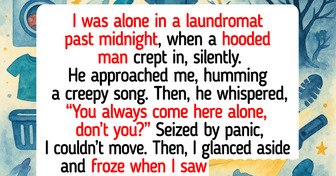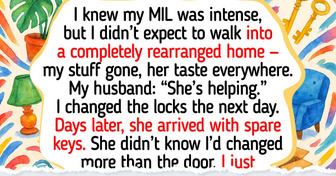You told her parents, it was up to them how it was dealt with. Not you.
I Fired the Nanny to Protect My Granddaughter—Now My DIL Banned Me

Boundaries between generations can be tricky — especially when love and protection collide. Many grandparents step in out of care, only to find their help turned into conflict. This story from one of our readers shows just how easily good intentions can go wrong.
Dear Bright Side!
When my granddaughter was born, I offered to help. My DIL, Claire, insisted on hiring a nanny instead — a 22-year-old she found. I didn’t say anything at first, but little things started to bother me.
Once, I found the baby crying in her crib while the nanny was on her phone. Another time, I saw her post a photo of my granddaughter’s nursery on her Instagram story.
She laughed it off — said she was “just showing her friends her job.” That was it for me. I told Claire and my son, and when they brushed it off, I called the agency myself and reported her. The next day, the nanny was gone.
Claire exploded. She said I’d “crossed every boundary” and banned me from visiting “until I learned to respect her decisions.” My son stayed quiet.
Now Claire refuses to speak to me, saying I “humiliated” her. But I’d do it again. Because if protecting my granddaughter makes me the villain — so be it.
Am I wrong?
Catherine

Thank you for sharing such a heartfelt letter — stories like this remind us that every family has its own version of love, limits, and lessons to learn.
Psychological Insight & Tips
Family therapists often say that conflict between mothers-in-law and daughters-in-law isn’t about who’s “right,” but about control and trust.
New parents are often overwhelmed and hypervigilant — their brains literally go into protection mode after childbirth. That means every comment, suggestion, or action can feel like criticism, even when it’s done out of love.
If you ever find yourself in a similar situation:
Acknowledge their authority first. Saying “You’re the mom, I just worry sometimes” can defuse tension fast.
Ask before acting. Even when you see something alarming, involve the parents unless there’s real danger.
Express care, not criticism. Use “I” statements (“I got scared seeing the baby alone”) instead of “you” ones.
Give space and time. Once emotions cool, gentle communication can rebuild bridges.
How to Rebuild Trust With Your Daughter-in-Law.
When family tension rises, especially between mothers- and daughters-in-law, rebuilding trust takes patience — and a little humility. These small steps can make a big difference.
- Don’t be afraid to apologize. Talk about what you regret. This can be as simple as saying, “I regret what happened earlier.”
- Give genuine compliments. Tell her she’s doing great — whether it’s her parenting, cooking, or style. Kind words build bridges.
- Try to see things her way. She’s not replacing you; she’s just finding her own way to love your son and raise her family.
- Keep visits short and sweet. Long stays can create pressure — leave while everyone still feels good.
- Skip the unsolicited advice. Wait for her to ask. When she does, offer help, not judgment.
- Celebrate her wins. The more she feels appreciated, the less she’ll feel the need to prove herself.
- Let your son go — lovingly. If you cling too tight, she’ll only pull further away.
- Avoid hot topics. Not every opinion needs to be shared. Peace is worth more than being right.
- Don’t vent to your son. What you tell him about his wife will always circle back. Save those talks for a trusted friend instead.
And most importantly: remember that love built on respect lasts far longer than love built on control.
At the end of the day, every family wants the same thing — safety, peace, and love for their child. Sometimes, the hardest part is realizing that protecting them isn’t always your role to play.
23 Kind Souls Who Proved the Softest Hearts Have the Strongest Beat
Comments
Related Reads
I Refuse to Let an Interviewer Belittle Me, So I Turned the Tables in Seconds

I Refuse to Cancel My Birthday Party for My Sick Stepson, I’m Not His Mom

I Asked My Team Member to Brush His Teeth, Now My Career Is on the Line

15 Stories That Prove a Mother-in-Law’s Love Is Quiet but Unbreakable

13 Stories That Prove Real Life Has More Drama Than Prime-Time TV

I Refused to Let My DIL Treat Me as Her Personal Chef—She Wasn’t Ready for My Wake-Up Call

18 Quiet Acts of Kindness That Turned Strangers Into Family

I Refuse to Keep Paying for My Sister’s Lavish Life—I’m Not Her Free ATM

My MIL Mocked Me at My Husband’s Birthday Party—I Gave Her a Brutal Reality Check

My MIL Rearranged My House While I Was at Work—So I Made My Own Move

I Got Fired the Day Before My Vacation—And HR’s Policy Was Their Biggest Mistake

10 Honest Stories That Capture the Struggles and Pain of Blended Families

